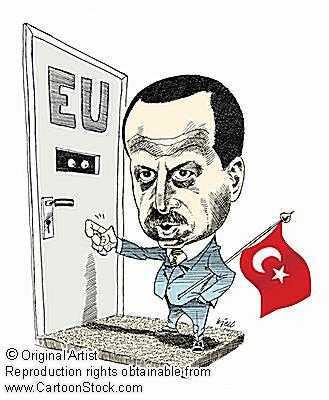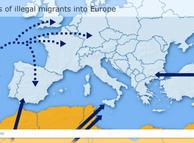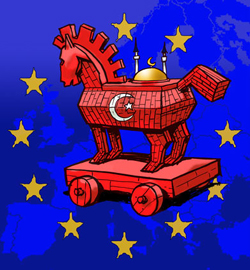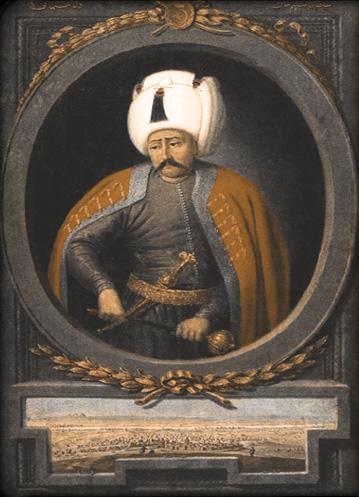============================================
Is Turkey Suitable for a European Union Membership?

Too good to be true, some people said.
The issue of Turkey’s accession to EU is definitely a very controversial topic. It has become a lengthy debate whether Turkey’s application for a membership of European Union (EU) should be granted or not. There are even some thoughts about whether Turkey needs to join EU or not. Turkey, a geographically Asian nation which is Muslim by population majority but secular by governing system, applied for EU membership since EU was still in form of European Economic Community (EEC) in 1959 but until now faces tough resistance, both from EU members with several reasons and from Turkey’s frequent policies which aren’t suitable to EU general circumstances. In the middle of this dispute, Turkey should better withdraw from accession to EU as the union didn’t really expect them to join and Turkey themselves doesn’t seem ready to follow the general circumstances of the union.

Applying since 1959, not accepted until now, that says something.
The most fundamental issue is the geographic location of Turkey. Only 3% of Turkey’s territory is in Continental Europe while the rest is in Asia. Its capital, Ankara, is not even in Europe. An Asian nation such as Turkey will of course have no rights to claim a membership for a European regional organization.

Hardly Europe for me.
Some Turks could argue that Ottoman Empire, a predecessor of modern Turkey state, was a superpower throughout Mediterranean Europe at early modern ages, thus strongly influence culture of Europe and should be considered as part of Europe. However, the general perception of territory of European continent, which borders Black Sea, Ural and Caucasus Mountains in the east, excludes Turkey. The Ottoman Empire conquest of Mediterranean Europe is also widely considered as colonialism and had destructive effect to the culture of that area, so the influence of Ottoman Empire didn’t make them accepted as part of Europe, but merely as an imperialist. Thus the acceptance of Turkey’s accession to EU is considered equal as acceptance of their ex-imperialist to join.






Just ask them, are Turkey Europe?
From left to right, sec:
Gjerg Kastrioti Skanderbeg of Albania,
leader of Albanian resistance against Ottoman Turks occupation.
Mihai Viteazul of Romania,
defending Romania and Wallachia against repeating Ottoman Turks invasions.
János Hunyadi of Hungary,
halting Ottoman Turks invading advance to European regions north of Danube.
Goce Delcev of Bulgaria,
leader of Bulgarian and Macedonian War of Independence against Ottoman Turks rule.
Alexandros Ypsilantis of Greece,
leader of Greek War of Independence against Ottoman Turks colonial power.
Ritter Johann of Austria,
leader of Holy Alliance opposing Ottoman Turks invasion in Naval Battle of Lepanto.
Yeah, they will surely approve. (sarcasm mode)
Another territorial reason is that if Turkey is allowed to join EU, this regional organization will border the Middle Eastern countries such as Iraq, Iran, and Syria; thus Turkey will hold a position as one of EU borders owner. As an economically unstable country, Turkey will face difficulties to protect EU borders by keeping the traffic with their Arabic neighbors from illegal activities such as drugs trade, women and children trafficking, and the most important, terrorism. Turkey is the location of a big drugs factory which gets their raw materials from Asia. If Turkey joins EU, this drugs dealer network will have direct access inside EU. Turkey will also easily become the gate for immigrants from poor Arabic countries to search for better living in EU Western European developed countries. The terrorist organizations based in the Middle East will also be easier to transport their members inside and outside EU, and we know that some of major EU nations are one of terrorists’ prime target. So, Turkey’s geographic location does not suit the conditions to be an EU member and even will be a threat inside EU if they were allowed to join.

If this is before Turkey joins, we can't know what it might be after that.
Cultural difference between Turkey and most EU members also became a problem, for Turkey’s dominant Muslim population (99.8%) compared to EU’s Christian majority is a strong reason behind several EU members’ resistance against Turkey membership. A nation which has a very different cultural background could potentially bring disintegration inside the union. Even now, before Turkey receives membership, many of EU members have already blatantly expressed their disapproval towards the idea. The most notable nation amongst them is Austria, which has historical hostility with religious background towards Ottoman Empire, the predecessor of modern Turkey state. France, Netherlands, Belgium and Germany have several problems with overwhelming Muslim immigrants and refuse Turkey membership in fear of other additional Muslim immigrants. So, it was obvious that Turkey’s cultural difference with another EU nations will cause disharmony inside EU if Turkey is allowed to join, and therefore is a strong reason to refuse Turkey’s accession to EU.

The EU members feared what happened in this Rotterdam skyline will be a trend in another European cities.
The thing people often consider as the biggest obstacle against Turkey membership is its bad relationships with several neighboring countries which are EU nations. With Greece, an EU member, Turkey has disputes over some areas in Aegean Sea which even has repeatedly caused high military tension between the two nations, which was a continuation of long-lasting rivalry and enmity that could be tracked back to the times of World War I, Ottoman conquests of Greece, wars between Seljuk Turks and Byzantine Empire, or even antiquity ages of Alexander The Great.

The fact that the Turks are sitting on 35% of what the Greeks at the old times claimed as their own, including their former imperial capital and most prestigious city, does not help at all.
Turkey also refuses to recognize the formal state of another EU member Cyprus, an island nation with Greeks majority but has Turks population as an effect of Turkish invasion in 1974. Instead, Turkey recognize Turkish Cyprus Republic, a de facto republic formed by Turkish Cypriots but is unrecognized by any nations or organizations. This is considered as the greatest obstacle for Turkey’s accession as this policy clearly shows Turkey’s hostility towards one of EU nations, thus could be considered as hostility towards the whole union. We can say that Turkey’s behavior against Greece and Cyprus will cause an internal conflict inside EU if they were allowed to join.

Turkey's persistence to win against Greece over Cyprus is one of their main obstacle for their EU membership application.
Turkey also has several policies against Eastern Orthodox Church. First, Turkey refuses to acknowledge Patriarch of Constantinople (a figure similar to Pope for Eastern Orthodox Church) as universal leader of Eastern Orthodox Church, and also refuses to grant Turkish nationality for him unless he is a Turk by birth. This is quite difficult because it means he must being born from an Orthodox Christian Turk father, which is only 0.01% from Turkish population. Second, Turkey refuses to reopen Halki Seminary, the largest Orthodox Christian theological school which is inside Turkey territory. These policies make Eastern European countries in EU, which are Orthodox Christian nations, have objections against Turkey’s membership. The strongest objections come from Greece, a very prominent Orthodox Christian country. These things clearly show how bad the prospect of Turkey’s relationship with their fellow EU members if they would have joined EU, a strong reason to refuse their accession.

Bartolomew, Patriarch of Constantinople, leader of 300 millions Orthodox Christians all over the world, a Greek... lives in Turkey, with only 4000 Orthodox populations, not even a Turkey citizen. Definitely will catch Greece's attention.
Turkey also has severe relationship with Armenia, a small traditional Christian country at its northern borders, for two major causes. First, Turkey refuses to recognize the mass killings of Armenians (with 1.7 million casualties) by Ottoman Empire in 1917 as genocide. At some European and even other countries, the refusal to acknowledge this event as genocide is considered a crime and could end with fine or imprisonment. Second, Turkey blames Armenia for aiding Nagorno-Karabakh independence movement. Nagorno-Karabakh is an area with Armenian ethnic majority, but inside the territory of Azerbaijan and is now struggling for independence from Azerbaijan. Azerbaijan, on the other hand, is a Turkic nation which has strong alliance with Turkey. As the follow-up, Turkey closes the borders with Armenia, executes economic embargo, and insists that the route of lucrative BTC (Baku-Tbilisi-Ceyhan) petroleum and gas pipeline bypass Armenian territory. EU views these behaviors as isolation against a weaker nation, therefore become objections against Turkey membership. With its harsh treatment against its smaller neighbors, Turkey shouldn’t expect a fair treatment from its bigger neighbor, the EU. For now, we can say that Turkey’s policy against Armenia, which has EU’s disapproval, is a big obstacle they put by themselves on their way to EU membership.

As long as Turkey are not willing to admit that they massacred about 2.000.000 Armenians (and I'm being generous with that number) about 100 years ago, they won't get a seat in EU. Not with that amount of Armenians in France.
Turkey’s seriousness about their desire to join EU is even questionable as Turkey shows no intention to fulfill EU’s human rights standards. First, Turkey is widely considered by EU as a country which doesn’t regard much to freedom of speech. Article 301 of Turkish penal code; which states it is a crime to show opinion which insulting Turk identity, Republic of Turkey, and its Grand National Assembly; is often used as a tool to ignore freedom of speech.

TCK 301 is imprisoning human rights.
Second, EU strongly opposes Turkey government’s strong discrimination against Kurds ethnic and other minorities living in Turkish territory; most notable for the prohibition to speak Kurdish in front of public and the restriction of TV station in Kurdish area except the government’s TV station (and it is even only 1.5 hours per week).

(Kurt = Kurds in Turkish language) With these systematically-planned eradication of Kurdish culture, Kurds identity in Turkey will completely disappear before all Turks could say "Avrupa Birligi".
Third, Turkey still holds strong discrimination against homosexuals, transgender people, and women’s role in political and social life. Freedom of speech and human rights are standard values accepted by every member of EU. Some countries which are considered not up to those standards tried hard to improve and then were accepted to be members of EU. If Turkey really wants to join EU, they should better adapt with the circumstances; and if they couldn’t, it means that they aren’t serious enough with their wish to join EU or their living values are really not suitable with EU and therefore they’d better withdraw their accession.

When you finally join EU, this kind of activity needs to be done repeatedly. Seriously, Turks, why the heck would you still want to join EU? (Pictures: gay parade in Istanbul)
Turkey’s potential is something that could be viewed as two-edged sword for EU. For those who support Turkey’s membership; the large, young, and quite-educated Turkish population along with their secular, moderate, and democratic government with its military power will strengthen the EU. Turkey’s great percentage of youth population (23% under 15 years old) will balance increasingly aging population percentage of EU. Some of Western countries hope that Turkey’s existence within EU will pledge its allegiance to West; thus get rid of potential Islamic extremism, military threat, and will help stabilize Turkey’s political and economic conditions. Furthermore, Turkey is expected to be a role model of stabilized democratic country in the midst of heating situation in the Middle East.

What a wonderful gift to join EU, right? PS: Funny, the ancient city of Troy is indeed located in current Turkey land.
But, for those who oppose Turkey’s membership, Turkish potential is viewed as a thing that could destroy EU from inside. Turkey’s youth population will cause rivalry in looking for job opportunities in EU nations. Turkey’s allegiance inside EU could be directed to United Kingdom, as both of the nations are strong supporters of United States, and it is considered will reduce EU’s independent stance against United States. Besides, instead of possibility to ‘influence’ the Middle Eastern world through Turkey, Turkey’s 70 million populations will bestow Turkey largest number of representatives at European Parliament if they join EU, thus grants Turkey large control in defining EU policies. So, Turkey could be considered as a country which has many potential but their potential is not needed and even harmful for EU, therefore their membership is also not needed.
EU what?
There are so many differences between Turkey and European Union, from the fundamental issues to the particular ones. Cultural and religion difference makes it hard to include an Islamic Turkey into an organization which is built upon a strong Christian culture, and also makes it hard to unify the point of view in facing such fundamental problems such as human rights. A new member with strong influence and resources, but also has unstable political condition and international policy, is considered harmful and will bring disharmony to the union, furthermore could lead to the end of union. With so many incompatibilities between two sides, for the future of European Union and the country itself, Turkey would be better not continuing their interest in joining EU.

Why are you trying so hard to become something that is not truly you?
Instead of trying to move closer to the Western countries, Turkey could strengthen the relationships with neighboring Islamic countries, with which they have same root, culture, heritage, geographical position, and point of view... and advance in technology and military aspects. With them, Turkey could gain more advantages and strengthen its position in international world as a leading side of Islamic nations.



What all of those former Ottoman Emperors, Head of Islamic Caliphate, Conqueror of Europe, would say; if they know that their descendants are begging, down on bended knees, to join the union of the nations they fought and conquered?
From left to right:
Mehmed II,
conqueror of Rumelia and Constantinople, the capital of Byzantine Empire.
Selim I,
conqueror of Egypt, Persia, and Arabia, unifying Islamic major powers.
Suleiman The Magnificent
conqueror of Greece, Balkans, Hungary, and nearly all of Europe.
Yeah, they will not object. (sarcasmts twice)
Egemenlik kayıtsız şartsız milletindir
(Sovereignty rests unconditionally with the nation, Turkey state motto)
.



Tidak ada komentar:
Posting Komentar